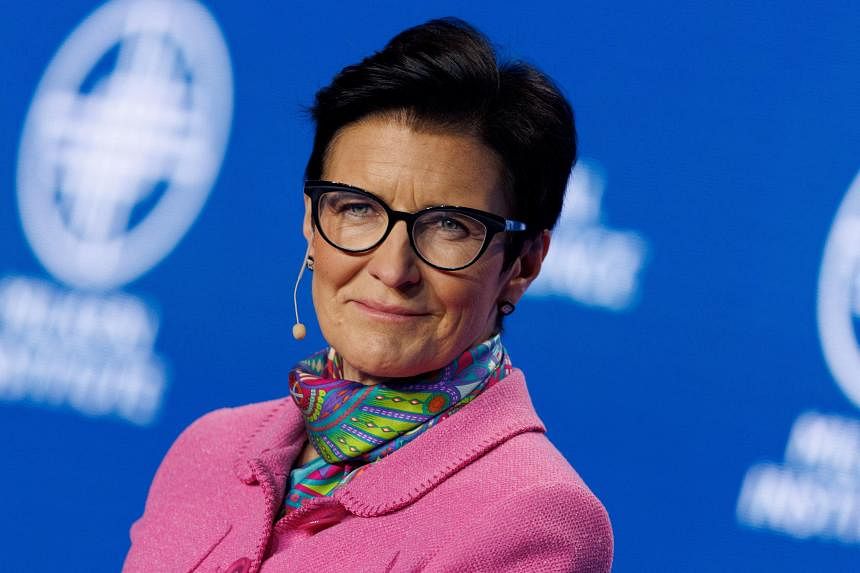NEW YORK – Citigroup investors have rewarded chief executive Jane Fraser with a share price boost after she announced a sweeping overhaul of Citi’s sprawling structure in September, cutting costs by laying off 5,000 employees. Next, they want to see growth in wealth management and investment banking.
Wall Street investors welcomed Ms Fraser’s overhaul, but warned that the CEO has major challenges ahead to boost returns and catch up with rivals, including regulatory problems, lacklustre earnings and an unsettled workforce.
“If this was a chess game, I would say the opening phase is over, and now the middle phase begins,” said Mr Peter Nerby, an analyst at ratings agency Moody’s.
Citi’s stock is so depressed that it is hard to lose money betting on it, said Mr Daniel Babkes, portfolio manager at Pzena Investment Management, which manages more than US$60 billion (S$80.7 billion) and owns Citi shares. “We are confident the bank can control expenses after the reorganisation”, and it has strong growth prospects in corporate banking, he said.
Citigroup shares have risen by 49 per cent since it announced the overhaul in mid-September, outpacing a 26 per cent climb for the KBW Bank Index.
The bank’s stock trades at 0.57 of book value, a measure of performance that falls short of JPMorgan Chase’s 1.73 or Bank of America’s 1.1.
But the company’s turnaround efforts also caused internal turmoil. Workers avoided signing up to long-term projects during the six-month reorganisation because they were unsure if they would be laid off, said a source who declined to be identified discussing personnel matters.
The process was lengthy because it affected many levels of the organisation, said a separate source close to the company.
The outlook for Citi is improving because of its job cuts, the quality of its loan portfolio and its reduced exposure to paper losses on securities, said Mr Ian Lapey, a portfolio manager at Gabelli Funds, which oversees US$30 billion and owns Citi shares.
Citigroup’s reshuffle represents an inflection point that will increase its efficiency, said Mr Hunter Doble, a portfolio manager at Hotchkis & Wiley, which has US$31 billion under management and owns shares of Citi.
Meeting the bank’s target of 11 per cent to 12 per cent return on tangible equity would fuel a big jump in the stock, given that its current profitability is much lower and will get closer to industry peers, Mr Doble added.
Citi will report its first-quarter earnings on April 12 and hold a virtual shareholders’ meeting on April 30.
It lost US$1.8 billion in the fourth quarter after taking several one-off charges that included losses with currency devaluation in Argentina and higher contributions to the Federal Deposit Insurance Corporation, that ensures deposits.
The lender’s biggest challenges are improving profits in banking and wealth management, according to Mr Nerby at Moody’s.
Challenges ahead
In an effort to boost performance, Ms Fraser recently hired two prominent executives to run the divisions: Mr Viswas Raghavan, former head of global investment banking at JPMorgan, and Mr Andy Sieg, who previously led Bank of America’s Merrill Wealth Management unit.
The recruitment of highly compensated executives was a snub to internal talent and detrimental to morale as employees were going through waves of layoffs, said the first source and another two people who also declined to be identified discussing personnel matters.
In September, Ms Fraser acknowledged the morale issue, saying the moves would not “be universally popular within our bank”, but added that “our strongest performers are going to be fully supportive of these moves, and it is absolutely the right thing to do for our shareholders”.
“Outsiders are what Citigroup needs now to really bring change,” said Bank of America analyst Ebrahim Poonawala.
Ms Fraser has said Citi will leverage its relationships with the world’s largest corporations to boost revenue in investment banking and wealth management.
She also plans to drive more growth through a newly created division focused on client service. Still, analysts are awaiting more details on the strategy for the key units.
Another area of focus is Citigroup’s US consumer business, which is much smaller than its rivals.
Retail deposits account for only US$105 billion of the company’s total US$1.3 trillion in deposits, with corporate deposits making up the bulk of the remainder. By contrast, JPMorgan Chase and Bank of America each have US$1 trillion or more in consumer deposits.
The US retail business is a drag on returns, finance chief Mark Mason told investors in February when asked about the bank’s strategy, saying the bank has fewer than 700 branches. Competitors have much larger networks.
When asked for comment about its plans in consumer banking, Citi spokespeople referred Reuters to executives’ earlier statements on its goals: to grow in the six US metropolitan areas where it has more branches, boost digital channels and prudently grow mortgages.
Overseas, Ms Fraser has made progress on her commitment two years ago to exit from 14 markets.
Citi has completed sales of nine businesses in Asia, including in Taiwan, the Philippines, Malaysia, India and Indonesia.
The bank is also winding down businesses in China, South Korea and Russia, and will try to sell its Polish bank and carry out an initial public offering for its Mexican business in 2025.
Citi will showcase its services division – which Ms Fraser refers to as the company’s crown jewel – at a June 18 event for investors.
The unit, which provides cash management, clearing and payment services for the world’s biggest corporations, reported record revenue of US$18.1 billion in 2023. The business is helped by Citi’s vast global presence in 95 countries.
As Citi proceeds with divestitures in international retail, services will account for a bigger chunk of its future profits, said Mr Lapey of Gabelli Funds.
“Despite disappointing earnings over the last couple of years, the company appears to be well positioned now,” he said. REUTERS

